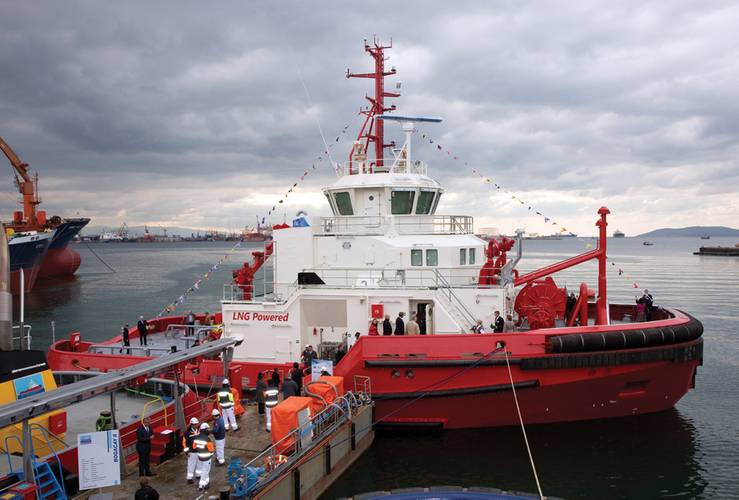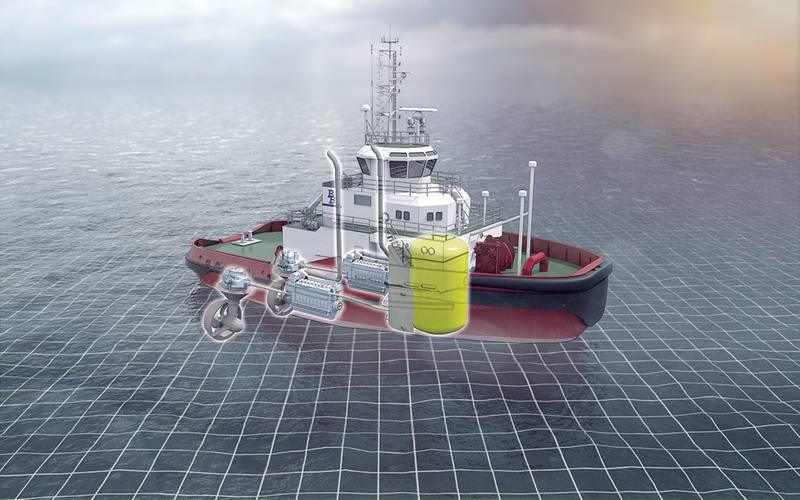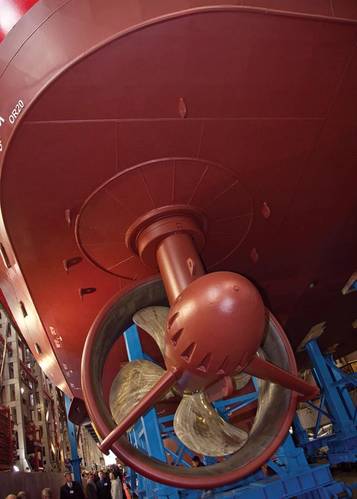Borgøy: the World’s first LNG-Fueled Tug
Late last year, an innovative project to design and build the world’s first LNG fuelled escort tugs became a reality when the Borgøy was handed over for sea trials by builder Sanmar in Tulza Bay near Istanbul.
For the Christening at the Sanmar Shipyard in Tuzla, representatives from the Turkish shipyard were joined by executives from Norwegian tug operator Buksér og Berging AS and from Rolls-Royce. Neil Gilliver, Rolls-Royce, President – Merchant, believes that delivery of the Borgøy and Bokn, each with 65-tonne bollard pull and a transit speed of 13.5 knots, will mark a step change in tug propulsion.
Gilliver added, “The completion of this vessel is highly significant for Rolls-Royce, Sanmar Shipyard and Buksér og Berging. We are extremely proud to have worked together on this successful project which heralds a new era for tug boat propulsion. Gas is gaining in popularity as a maritime fuel, and its environmental credentials, combined with lower costs are seeing many operators select it over traditional fuels, across a range of ship types.”
The project makes sense on many levels. Most of the world’s tug fleets operate close to shore, where emissions regulations are most stringent and as LNG becomes more widely available, it is expected that more major ports will also opt for the clean, lower cost and smoke-free fuel to power their tugs.
Following sea trials, the vessel sailed in mid-January for Kårstø Terminal in northern Norway where gas from some thirty offshore fields is landed and processed. There the ground-breaking craft will commence long-term charters with Norwegian state energy firm Statoil ASA (STOHF) and Gassco, the operator of the gas transportation network in early in 2014.
As Europe’s largest export facility of natural gas liquids and third largest in the world, the Kårstø Terminal will depend on these escort tugs, together with others, for the safe handling and manoeuvring of LNG tankers, LPG carriers and chemical tankers 24/7 and 365 days a year. The Borgøy and Bokn, each with fire-fighting and oil recovery capability as well as escort notation, are now the world’s most environmentally friendly tugs.
Propulsion
Both vessels are powered by a pair of Rolls-Royce Bergen C26:33L6PG lean-burn gas engines that have a combined output of 3,410 kW at 1,000 rpm and are directly coupled to Rolls-Royce US35 azimuth thrusters, each fitted with a 3m dia CP propeller in a nozzle. The propulsion package also includes a vertically-mounted gas tank to save space. The single cryogenic fuel tank has a capacity of 80m³, containing enough fuel to last up to five or six days and can be bunkered in around 45 mins. The rest of the fuel system is split and duplicated into two separate gas supply lines and power trains. Each is monitored by the sophisticated Rolls-Royce Acon safety, alarm and control system with gas detection in all areas. The two parallel propulsion trains provide full redundancy. Unlike conventional diesels which require fuel pumps, filters and injectors, gas is fed to the engines by pressure in the LNG storage tank. This will mean significantly less maintenance for the fuel supply system over time.
The Environment
The benefits of LNG as a marine fuel, particularly for inshore harbour craft which often operate in pre-defined areas where access to bunkering facilities does not present the same challenge as for deep-sea operators. And, a 25 percent and 80-90 per cent reduction in CO2 and NOx emissions respectively, and the virtual elimination of SOx emissions and particulates – means that Rolls-Royce gas fuelled Bergen engines meet IMO Tier II and Tier III regulations as well as US Environmental Protection Agency rules on NOx. The tugs are expected to have improved fuel consumption, lower maintenance costs, reduced lube oil consumption and a much-improved working environment for ships’ crews.
(As published in the February 2014 edition of Marine News - www.marinelink.com)















